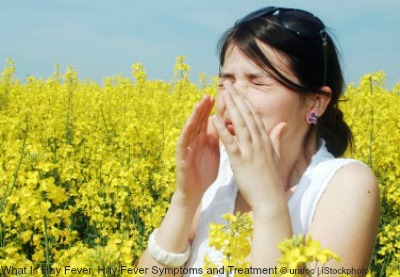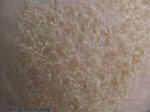What Is Hay Fever?
Is It The Bane Of Your Summer?
It Doesn't Need To Be
So, what is hay fever? Basically put, it is an allergic reaction to pollen.
Pollen is a fine 'dust' that is part of a plant's reproduction process. It is released during the process. This is how it becomes airborne and is able to cause a problem for anyone with an allergy to it.
Not all pollen is the
same. Some people have a reaction to one type but not to another.
Also different types of pollen affect people at different times of the year.

Pollen can come from
- Grass. The most common pollen allergy. The majority of people with hay fever find grass a problem. Your symptoms would be more severe from May to August
- Trees. There are a number of trees who's pollen can cause hay fever symptoms.
These include
- Ash
- Cedar
- Oak
- Birch. Around a quarter of hay fever sufferers have an allergy to this pollen. Symptoms could be worse around April
- Weeds. Pollen from ragwort, nettles and dock can be an issue. Their pollen is more abundant in September and October
The spores of fungi could also make it worse.
If you suffer from hay fever all year round you could be allergic to pet dander, dust mites or moulds.
Pollen Count
The pollen count is measured by the number of pollen grains in one cubic metre of air, over 24 hours.
If you wanted to see a
pollen count today, it is very likely, especially during hay fever
season, to find one as part of a weather report.
In the UK the Met
Office provides a pollen forecast. There is also a great site in the US, pollen.com, that gives information about the pollen levels in your area.
The count is normally talked about in 4 levels
- Low
- Moderate
- High
- Very High
If you see that the pollen count is going to be high in your area you can take some preventative measures. As well as taking some medication.
Hay Fever Symptoms
Pollen causes hay fever symptoms by getting into your nose, throat, mouth and ears. It irritates their lining, and that starts an allergic reaction.
The reaction starts
because the body perceives the allergen as a threat. This causes the
body to release a substance called histamine. Histamine causes the
symptoms of hay fever.
These symptoms include
- watery eyes
- itchy eyes
- blocked or runny nose
- sneezing
- tickerly throat
- headache
Your doctor will look
at your symptoms to work out if you are suffering from hay fever. It
is normally quite easy to recognise.
If you are diagnosed
with the condition, it will help if you know what is making it
worse.
One way to find out
which pollen/s you are allergic to, is to have a skin prick test. They
can find out which allergens are causing your hay fever.
If you are unable to have a skin prick test, if for example you are taking an antihistamine, or you have severe eczema, then you may be given a RAST test. This will determine whether you definitely suffer from hay fever.
You can read more about allergy testing here
Once your diagnosis is definite, you can start to control your symptoms better.
Prevention Of Hay Fever
There are a few things that you can do for yourself to help improve it.
- In the months when the pollen count is at its worse, stay indoors as much as you can
- Try and keep your windows shut. Especially when the pollen count is high
- When you go out you could wear some wraparound glasses. These limit the amount of allergen that gets in your eyes
- After being outside wash your clothes and have a bath or shower. This will help remove a lot of the pollen. Limiting any damage it may do
- When in your car, keep the windows shut
- Avoid going to parks, or any other grassy areas. Especially when the count is high, and when the grass has been freshly cut
- Dab some Vaseline into
the inside of your nostrils. Putting a little in the bottom of your
nose will help prevent pollen entering through your nose
Although you may follow
precautions to limit your hay fever, you will probably find that you
will still need to use some sort of treatment.
What Is Hay Fever Treatment
There are a few different treatments that can be brought over the counter, or prescribed by your doctor.
Antihistamine Tablets
Antihistamines are given because they fight the histamine that is released by your immune system to fight the allergen. The histamine produces the symptoms of your allergy. In the case of hay fever it could be runny eyes, runny nose or sneezing.
Antihistamines will help reduce hay fever symptoms. You can read more on antihistamines here.
You can take them when
you first get the symptoms. And also when the pollen count is going
to be high. This can help prevent it before it starts.
There are some antihistamines that may make you drowsy. If you take these avoid driving and using machinery.
Nasal Sprays
There are a few different nasal sprays that are available
- Antihistamine. These
can be used when they are required. They work quite quickly. They can
also help to reduce the chance of symptoms. Mainly any symptoms that
affect your nose. If it is runny, itchy or if you suffer with
sneezing. They don’t tend to help with congestion. A common one
used is azelastine
- Decongestant. Mainly
used to help with a blocked nose. Should not be used for a long
period of time. Only use for up to 7 days. Any longer and they may
cause congestion rebound. This is when the spray makes the symptoms
of a blocked nose worse. So congestion worsens. You can buy them from
a pharmacy. They can also be prescribed by your doctor. A common one
used is xylometazoline
- Steroid. This type of spray is slower to work on symptoms. They are taken regularly over a period of time. It can take up to 3 weeks for them to work. So it is a good idea to start using them at least 3 weeks before the hay fever season starts. They work well on any symptoms that affect your nose and eyes. Good to use on severe symptoms. They can be used everyday to keep your hay fever away. Just always follow the instructions, to make sure you take the right dosage. You can get some brands at your local pharmacy, or get them on prescription.
Steroid Tablets
These are used if you need some quick relief from your hay fever. For example, if you have an important event coming up, like a wedding.
You would unlikely be
prescribed corticosteroid tablets for longer than 10 days. Taking for
longer than that may increase your chances of suffering from side
effects.
You can use nasal sprays alongside them.
You can read more about oral steroids here
Eye Drops
Eye drops are used to treat the symptoms of hay fever that affect your eyes.
There are two main
types used
- Antihistamine eye drops
- Cromoglicate eye drops
They will help with
itchy, watery and red eyes. Bringing quick relief. They can be used
alongside antihistamine tablets and nasal sprays.
You can buy some from the pharmacy, and some are available on prescription only.
Different treatments can be used together. This helps, as between them they can help with all the symptoms of your hay fever.
If you find that the above treatments are not successful in relieving your symptoms there is another option, immunotherapy treatment.
Immunotherapy
This type of treatment is carried out at a hospital or a special centre.
Sometimes referred to as the hay fever injection.
It involves injecting
small amounts of substances, you have an allergy to, into your body.
You are then monitored
for around an hour. This is to look at how you react to it. And to
make sure that there are no serious side effects, like anaphylactic
shock.
The treatment allows your body to get used to the allergen. To build up a tolerance. This means that your body wont produce as much antihistamine. So your hay fever symptoms would not be as severe.
Having hay fever can affect your daily life. Whether you are school, at work or at home, it can have a negative impact on your life.
If you make your environment as hay fever friendly as possible, and use the right medications regularly, you should be able to limit the impact it has.
Return From What Is Hay Fever to Atopic Disease
Return From What Is Hay Fever to What Is Eczema
Search What Is Eczema?
Advertising on What Is Eczema?
We are a participant in the Amazon Services LLC Associates Program, an affiliate program which allows sites to earn fees by advertising and linking to amazon.com. If you make a purchase through a link on this page, I may receive a small commission, at no extra cost to you. Many thanks
